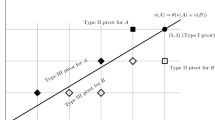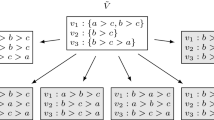Abstract
Palfrey (A mathematical proof of Duvergers law, 1989) shows that in large electorates with deterministic voter population, the expected equilibrium vote share of the weakest party tends to zero asymptotically. We extend this result to the uncertain case where the number of valid votes is a random variable satisfying a mild condition. Special cases include the degenerate, Poisson, binomial, and negative binomial distributions. In particular, we demonstrate that no matter how the number of valid votes fluctuates, as the probability of having a large number of valid votes approaches one, the expected equilibrium vote shares of the weak parties are asymptotically negligible.
Similar content being viewed by others
References
Duverger M (1964) Political parties: their organization and activity in the modern state. Methuen, London
Eguia JX (2007) Citizen candidates under uncertainty. Soc Choice Welf 29: 317–331
Kallenberg O. (1983) Random measures. Academic Press, London
Milchtaich I. (2004) Random-player games. Game Econ Behav 47: 353–388
Milgrom PR, Weber RJ (1985) Distributional strategies for games with incomplete information. Math Oper Res 10: 619–632
Myerson RB (1993) Effectiveness of electoral systems for reducing government corruption: a game-theoretic analysis. Game Econ Behav 5: 118–132
Myerson RB (1998) Population uncertainty and Poisson games. Int J Game Theory 27: 375–392
Myerson RB (2000) Large Poisson games. J Econ Theory 94: 7–45
Myerson RB (2002) Comparison of scoring rules in Poisson voting games. J Econ Theory 103: 219–251
Palfrey TR (1989) A mathematical proof of Duvergeros law. In: Ordeshook PC (eds) Models of strategic choice in politics. University of Michigan Press, Ann Arbor, pp 69–91
Rae DW (1971) The political consequences of electoral laws, 2nd edn. Yale University Press, New Haven
Author information
Authors and Affiliations
Corresponding author
Rights and permissions
About this article
Cite this article
Chen, Y., Xia, A. The wasted vote phenomenon with uncertain voter population. Soc Choice Welf 37, 471–492 (2011). https://doi.org/10.1007/s00355-010-0500-7
Received:
Accepted:
Published:
Issue Date:
DOI: https://doi.org/10.1007/s00355-010-0500-7




